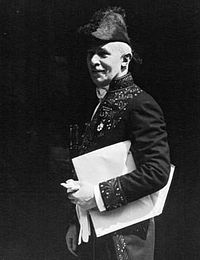André Chaumeix

André Chaumeix (6 June 1874, Chamalières, Puy-de-Dôme – 23 February 1955) was a French academician, journalist, and literary critic. He was the fourteenth member elected to occupy seat 3 of the Académie française in 1930.
He was elected member of the French Academy on May 22, 1930 in the chair of Georges Clemenceau. He acquired a great influence there, making and unmaking elections.[1] With the advent of the Vichy regime in 1940, André Chaumeix, along with the majority of academics, became a supporter of Marshal Pétain and of state collaboration.[2] In 1941, he wrote a programmatic article in the Revue des deux mondes in favor of the National Revolution: "[Petain] wanted to revive the healthy customs (...) that a senseless policy had banished for forty years and more. He endorsed in choice terms the brand-new policy of collaboration announced at Montoire: "France is an indispensable part of Europe (...) No one knows what the future world will be. It is possible that we will have to fulfill a useful and active mission. We will only fulfill it if we are a renewed nation".[3]
In the Maurrasian press, he then wrote to contribute to the work of "national renovation" by maintaining the pure French style, to stigmatize democracy,[4] "the regime of ease," with monarchist accents,[5] and the writers of the Enlightenment and the Romantics who had become involved in the political debate.[6] In these writings mixing literary and political considerations, he frequently quotes Maurras.[5]
References
[edit]- ^ Bident, Christophe (2018-11-20), "The Passion of Silence", Maurice Blanchot, Fordham University Press, pp. 219–224, doi:10.5422/fordham/9780823281763.003.0032, ISBN 9780823281763, S2CID 194268752, retrieved 2022-09-19
- ^ Vergez-Chaignon, Bénédicte (2015). "François Broche, Dictionnaire de la Collaboration. Collaborations, compromissions, contradictions, Paris, Belin, 2014, 928 p., ISBN 978-2-7011-8947-5". Revue d'histoire moderne et contemporaine. 62–1 (1): 208–209. doi:10.3917/rhmc.621.0208. ISSN 0048-8003.
- ^ "Brunetiere, Ferdinand, (1849–1906), Directeur de la Revue des deux Mondes; président du Syndicat de la Presse Périodique", Who Was Who, Oxford University Press, 2007-12-01, doi:10.1093/ww/9780199540884.013.u184198, retrieved 2022-09-19
- ^ "Candide : grand hebdomadaire parisien et littéraire ["puis" littéraire et parisien]". Gallica. 1942-10-14. Retrieved 2022-09-19.
- ^ a b "Candide : grand hebdomadaire parisien et littéraire ["puis" littéraire et parisien]". Gallica. 1943-04-14. Retrieved 2022-09-19.
- ^ "Candide : grand hebdomadaire parisien et littéraire ["puis" littéraire et parisien]". Gallica. 1943-08-11. Retrieved 2022-09-19.
